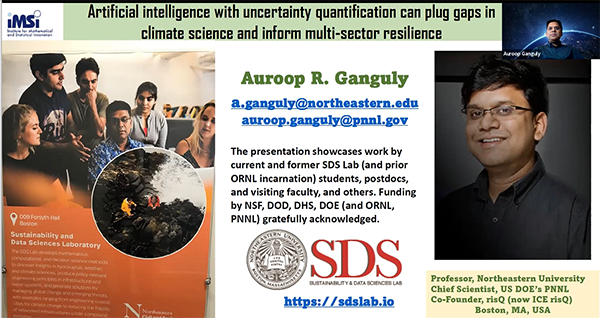Artificial intelligence with uncertainty quantification can plug gaps in climate science and inform multi sector resilience
Presenter
October 31, 2022
Abstract
Global climate and earth system models (ESMs), which numerically solve partial differential equations with high performance simulations, continue to have knowledge gaps and exhibit intrinsic variability for stakeholder relevant variables and resolutions. Data-driven sciences integrated with process understanding, especially the physics or biogeochemistry that may not be fully captured within the simulations, are critical to improve model parameterizations, develop a comprehensive characterization of variability and uncertainty, and extract scientific insights from archived model simulations. Furthermore, data-driven discrete event simulations have been proposed to incorporate societal dimensions such as management of watersheds in the land component of earth system models. The first part of this presentation will rely on our work at the Sustainability and Data Sciences Laboratory (SDS Lab) and the extant literature to elucidate the role of Artificial Intelligence (AI) and high performance computing (HPC), along with falsifiability and Uncertainty Quantification (UQ), in three areas, specifically, post-processing ESM simulations with knowledge-guided AI for extracting stakeholder and policy relevant insights, embedding AI within ESM for improving processes and parameterizations, and incorporating human and societal dimensions within ESMs. The second part of the presentation will focus on Machine Learning (ML), even touching upon the "unreasonable effectiveness" of Deep Learning, based downscaling in climate with a particular focus on UQ along with evaluation and falsifiability, such that ESM simulations at lower resolutions can be credibly translated to information across local to regional scales to enable stakeholder decisions and policy. The presentation will conclude with a short discussion on making climate science actionable by relying not just on governmental or intergovernmental action but also through innovations in the private sector via large corporations and sustainable startups.
